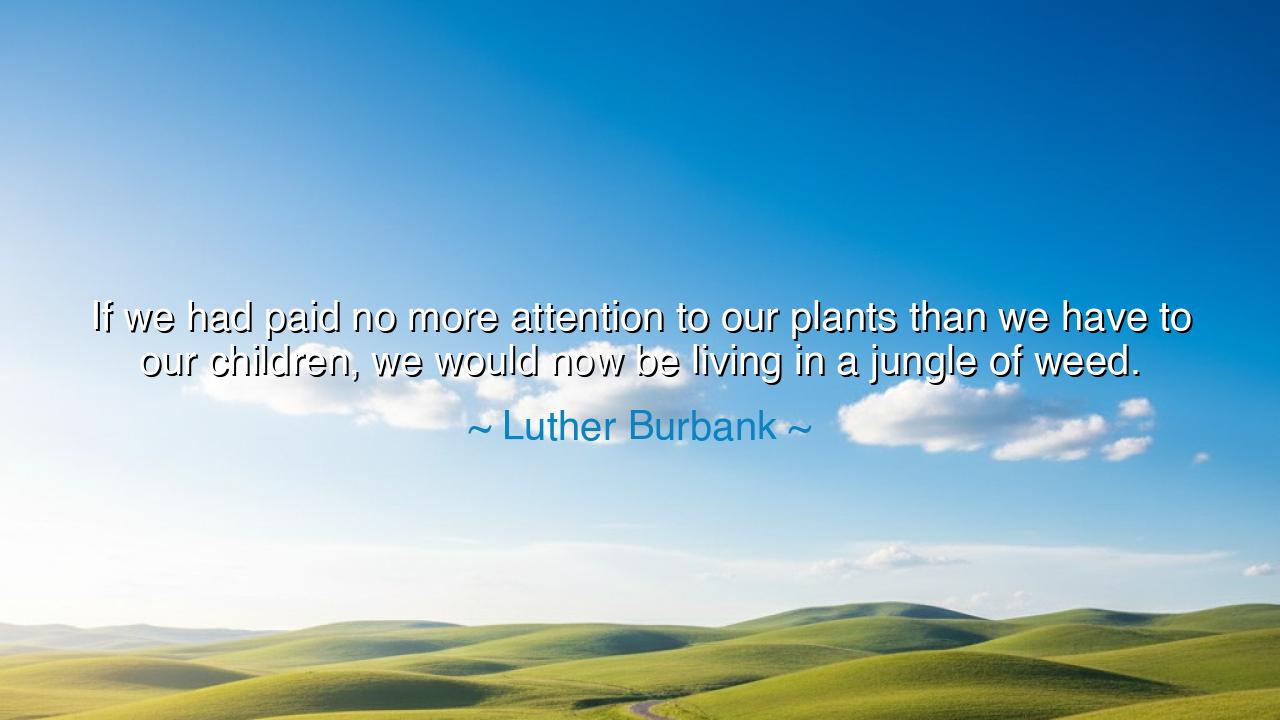
If we had paid no more attention to our plants than we have to
If we had paid no more attention to our plants than we have to our children, we would now be living in a jungle of weed.






In the words of Luther Burbank: “If we had paid no more attention to our plants than we have to our children, we would now be living in a jungle of weed.” This statement, though simple in its form, is a thunderclap of warning to the generations. It reminds us that just as gardens demand patient care, pruning, and nourishment, so too do the souls of the young. A gardener who abandons his vines finds them tangled and fruitless; so too a parent or society that neglects its children reaps confusion, rebellion, and sorrow.
The ancients well understood this truth. The Greeks spoke of paideia, the shaping of the child into a noble citizen, not by accident but by careful cultivation. Plato himself taught that the untrained soul, left to its wild desires, was like a field overrun by weeds. Only through attention, guidance, and discipline could harmony be produced. Burbank, a master of the soil, draws upon this same eternal metaphor: that neglect in youth yields ruin in maturity, and that societies which ignore their children will one day be choked by their own neglect.
History offers us vivid examples. Consider the decline of Rome, when discipline and moral training gave way to indulgence and neglect. The younger generations were raised more by luxury than by labor, more by servants than by parents. The weeds of vice and selfishness overtook the garden of Roman virtue, and an empire that had once conquered the world was itself conquered from within. Rome fell not only because of the sword of the barbarian, but because its children had been left untended, like fields abandoned to thorns.
And yet, there are stories of the opposite, when careful cultivation bore fruit for centuries. The Spartans, though severe, understood that the strength of their city rested upon the disciplined raising of their youth. Each child was watched over, trained, and shaped to serve the greater whole. Their methods may seem harsh, but their principle was clear: no civilization can endure if its children are abandoned to the chaos of their own impulses. The garden must be tended, and the weeds must be pulled, if order and beauty are to survive.
Burbank’s imagery of the jungle of weed is more than horticultural; it is prophetic. Weeds spread quickly, demanding nothing, offering little. They represent neglect—easy to allow, but destructive in the end. So too with neglected children: without guidance, their natural energy grows wild, their potential is wasted, and their souls risk being entangled in confusion. The jungle is not evil by design—it is simply what happens when no one cares enough to tend the soil.
The lesson is clear: society must treat its children as its greatest garden. Parents must not assume that growth will take care of itself. Teachers must not abandon their duty to shape not only the mind, but the character. Communities must see every child, not only their own, as a seed of the future that must be nurtured with patience and care. To do otherwise is to allow the weeds to overrun the harvest, until the future itself becomes a wilderness.
Practical action lies before us. Invest time in your children—listen to their questions, guide their choices, nurture their virtues, and correct their errors. Build schools that cultivate wisdom, not merely knowledge. Value discipline, but temper it with love. See in every child the seed of tomorrow’s world, and treat them with the same devotion a gardener gives to his most precious tree. For the garden of humanity is only as strong as the care we give to the youngest plants.
Thus, Burbank’s words ring as ancient truth clothed in modern form: if we abandon our children, we will inherit not a garden, but a wilderness. But if we tend them with care—watering them with love, pruning them with wisdom, guarding them with vigilance—we shall reap not weeds, but a harvest of greatness that will endure for generations.






AAdministratorAdministrator
Welcome, honored guests. Please leave a comment, we will respond soon